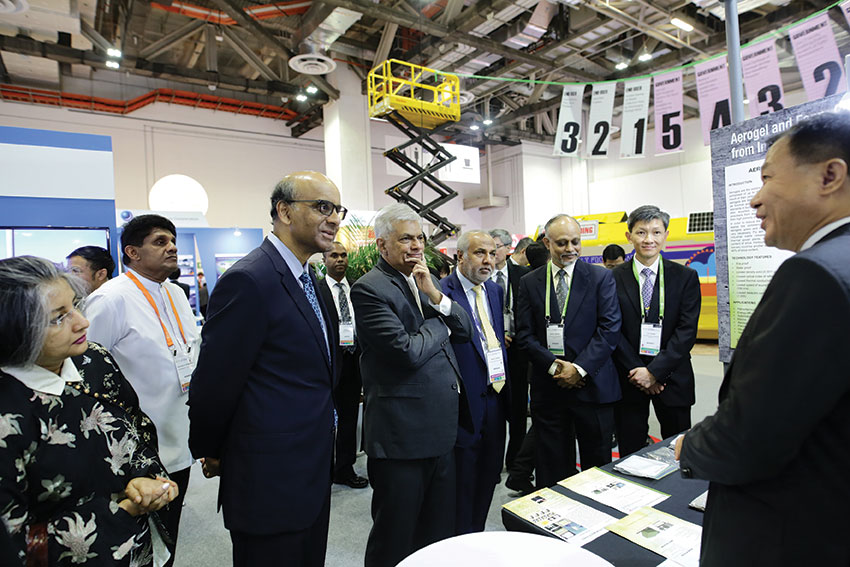Sep - Oct 2018
World Cities Summit 2018
October 28, 2018

Liveable and sustainable cities: Embracing the future through innovation and collaboration
Over 130 mayors and city leaders from 128 cities convened at the sixth edition of the World Cities Summit held in Singapore, sharing knowledge and learnings as well as addressing challenges and innovations for future-ready cities. Sixteen Memorandums of Understanding (MOUs) and agreements were inked, forging new partnerships and paving the way for collaborations between cities and stakeholders in the public, private and people sectors.
Attended by more than 1,700 delegates, this global platform provided opportunities for city leaders, industry experts and leading academics to interact. They explored how cities can be more liveable and sustainable through better urban governance, planning, building resilience and leveraging on integrated urban solutions to meet future urban demands and placemaking challenges and opportunities.
Held from 8 to 12 July, the 2018 edition of the World Cities Summit- Singapore International Water Week-CleanEnviro Summit Singapore (WCSSIWW- CESS) integrated events drew more than 24,000 trade attendees including government officials; industry leaders and city experts; academics; as well as representatives from the business community across 110 countries and regions. This year, WCS went beyond the broad themes of urban governance and liveable cities to embrace the future of cities through innovation and collaboration.
Creating people-centric cities: beyond urban infrastructure
Besides combining good governance and engagement of their citizens, cities are also looking to become inclusive, creative and sustainable with a high quality of life. Citizen involvement and proper communication with stakeholders is crucial in shaping people-centric and liveable cities. Beyond urban infrastructure, citizen engagement should be integrated for all plans and ground-up processes should be incorporated into day-to-day operations. Big data presents the opportunity to allow decision-making on the finest details, providing transparency to all citizens.
Achieving inclusive and sustainable cities
At the joint opening ceremony held on 9 July, Tharman Shanmugaratnam, Deputy Prime Minister and Coordinating Minister for Economic and Social Policies, Singapore, welcomed all countries’ leaders and distinguished guests, including Ranil Wickremesinghe, Prime Minister, Sri Lanka; Kristalina Georgieva, Chief Executive Officer, The World Bank Group; and Stephanie Von Friedeburg, Chief Operating Officer, International Finance Corporation. In his address, he spoke about the compounded challenges that we face in the next 15 years globally, where different risks such as “poorly managed urbanisation, climate change, infectious disease threats, growing young populations that are ill-equipped for the future of work, and unequal rather than inclusive growth in many societies” are interlocking, resulting in a “challenge much larger than before”.
As the “challenge is most severe in the developing world”, DPM Shanmugaratnam stated that “it is our responsibility, wherever we are, to contribute to innovations and solutions that can be applied to solving problems elsewhere—the dynamic that the three summits here this week aim to promote—spurring innovations in both the public and private sectors, and spreading solutions and best practices.” He observed that this is an opportunity to exchange knowledge, “to ensure a more sustainable environment, effective investments in human capital, and urban planning that encourages cohesive rather than segregated communities”.
Amongst the examples that DPM Shanmugaratnam cited, he mentioned Prof Rita Colwell, this year’s Lee Kuan Yew Water Prize laureate, whose pioneering research has helped transform the way we seek to control cholera, and improve water safety and the lives of millions of people around the world. He also cited the new mega facility in Tuas, Singapore, which comprises a waste water treatment plant and a waste-to-energy plant. Lastly, he highlighted the potential in the ASEAN Smart Cities Network (ASCN), “a collaborative platform of 26 ASEAN cities that are working towards the common goal of smart and sustainable urban development”.
He concluded by expounding that while we have to make the most of technology, “it is also critical that we empower communities and develop the social capital that helps ensure that urban innovations have broadly felt benefits”.
To read the complete article, get your hardcopy at our online shop/newsstands/major bookstores; subscribe to FuturArc or download the FuturArc App to read the issues!
Previously Published Happening
Contact us at https://www.futurarc.com/contact-us for older articles.

